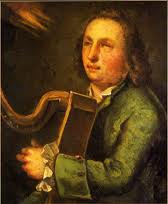Annotation:Isabella Burke: Difference between revisions
No edit summary |
m (Text replacement - "garamond, serif" to "sans-serif") |
||
| (2 intermediate revisions by 2 users not shown) | |||
| Line 1: | Line 1: | ||
=='''Back to [[{{BASEPAGENAME}}]]'''== | =='''Back to [[{{BASEPAGENAME}}]]'''== | ||
---- | ---- | ||
<p><font face=" | <p><font face="sans-serif" size="4"> | ||
'''ISABELLA BURKE''' (Isiabal Ni Buaircac). AKA | '''ISABELLA BURKE''' (Isiabal Ni Buaircac). AKA – "Isabel Burke." Irish, Slow Air or Planxty (3/4 time). D Minor (most versions): A Minor (J. Johnson): G Minor (Barnes). Standard tuning (fiddle). One part (Johnson): AB (most versions): AAB (Barnes). Composed by Irish harper Turlough O'Carolan (1670–1738). The melody appears in Edward Bunting's (1773–1843) c. 1800 manuscript collection (held at Library of the Queen's University, Belfast) and in his '''A General Collection of the Ancient Irish Music''' (London, 1796, p. 30), although it was first published in John and William Neale's '''Collection of the Most Celebrated Irish Tunes''' (Dublin, c. 1726). Bunting, however, did not attributed the melody to O'Carolan, although Pigot and Hardiman did. Donal O'Sullivan (1958) notes that Hardiman (who is considered reliable) believed "Isabella Burke," "Thomas Burke," and "Planxty Burke" were "composed for a respectable family of that name near Castlebar." No record of the name Isabella appears in O'Carolan's time in any of the genealogies of the major Burke families in the area, and it is not known who she might be. The melody also appears in John Mulholland's '''Ancient Irish Airs''' [https://urresearch.rochester.edu/institutionalPublicationPublicView.action?institutionalItemId=10258] (Belfast, 1810) and flute player John Clinton's '''Gems of Ireland''' (1841). | ||
<br> | <br> | ||
<br> | <br> | ||
</font></p> | </font></p> | ||
<p><font face=" | [[File:carolan.jpg|200px|thumb|left|Turlough Carolan]] | ||
<p><font face="sans-serif" size="4"> | |||
''Source for notated version'': | ''Source for notated version'': | ||
<br> | <br> | ||
<br> | <br> | ||
</font></p> | </font></p> | ||
<p><font face=" | <p><font face="sans-serif" size="4"> | ||
''Printed sources'': Barnes ('''English Country Dance Tunes, vol. 2'''), 2005; p. 135 (appears as "Twelve for the Twelve Apostles", the name of a 1994 country dance by Fried de Metz Herman, set to the tune). Bunting | ''Printed sources'': | ||
Barnes ('''English Country Dance Tunes, vol. 2'''), 2005; p. 135 (appears as "Twelve for the Twelve Apostles", the name of a 1994 country dance by Fried de Metz Herman, set to the tune). | |||
Bunting ('''Ancient Music of Ireland'''), 1796; No. 56. | |||
Clinton ('''Gems of Ireland'''), 1841; No. 139, p. 70. | |||
'''Complete Collection of Carolan's Irish Tunes''', 1984; No. 12, p. 31. | |||
S. Johnson ('''Kitchen Musician No. 3: Carolan'''), 1983 (revised 1991, 2001); p. 9. | |||
Mulholland ('''Ancient Irish Airs'''), 1810; p. 81. | |||
John & William Neal ('''A Collection of the Most Celebrated Irish Tunes'''), 1724; p. 14. | |||
O'Neill (Krassen), 1976; p. 233. | |||
O'Neill ('''Music of Ireland: 1850 Melodies'''), 1903; No. 654, p. 117. | |||
O'Sullivan ('''Carolan: The Life, Times and Music of an Irish Harper'''), 1958; No. 12. | |||
<br> | <br> | ||
<br> | <br> | ||
</font></p> | </font></p> | ||
<p><font face=" | <p><font face="sans-serif" size="4"> | ||
''Recorded sources'': <font color=teal></font> | ''Recorded sources'': <font color=teal></font> | ||
</font></p> | </font></p> | ||
<br> | <br> | ||
<br> | <br style="clear:both"/> | ||
---- | ---- | ||
=='''Back to [[{{BASEPAGENAME}}]]'''== | =='''Back to [[{{BASEPAGENAME}}]]'''== | ||
Latest revision as of 13:27, 6 May 2019
Back to Isabella Burke
ISABELLA BURKE (Isiabal Ni Buaircac). AKA – "Isabel Burke." Irish, Slow Air or Planxty (3/4 time). D Minor (most versions): A Minor (J. Johnson): G Minor (Barnes). Standard tuning (fiddle). One part (Johnson): AB (most versions): AAB (Barnes). Composed by Irish harper Turlough O'Carolan (1670–1738). The melody appears in Edward Bunting's (1773–1843) c. 1800 manuscript collection (held at Library of the Queen's University, Belfast) and in his A General Collection of the Ancient Irish Music (London, 1796, p. 30), although it was first published in John and William Neale's Collection of the Most Celebrated Irish Tunes (Dublin, c. 1726). Bunting, however, did not attributed the melody to O'Carolan, although Pigot and Hardiman did. Donal O'Sullivan (1958) notes that Hardiman (who is considered reliable) believed "Isabella Burke," "Thomas Burke," and "Planxty Burke" were "composed for a respectable family of that name near Castlebar." No record of the name Isabella appears in O'Carolan's time in any of the genealogies of the major Burke families in the area, and it is not known who she might be. The melody also appears in John Mulholland's Ancient Irish Airs [1] (Belfast, 1810) and flute player John Clinton's Gems of Ireland (1841).

Source for notated version:
Printed sources:
Barnes (English Country Dance Tunes, vol. 2), 2005; p. 135 (appears as "Twelve for the Twelve Apostles", the name of a 1994 country dance by Fried de Metz Herman, set to the tune).
Bunting (Ancient Music of Ireland), 1796; No. 56.
Clinton (Gems of Ireland), 1841; No. 139, p. 70.
Complete Collection of Carolan's Irish Tunes, 1984; No. 12, p. 31.
S. Johnson (Kitchen Musician No. 3: Carolan), 1983 (revised 1991, 2001); p. 9.
Mulholland (Ancient Irish Airs), 1810; p. 81.
John & William Neal (A Collection of the Most Celebrated Irish Tunes), 1724; p. 14.
O'Neill (Krassen), 1976; p. 233.
O'Neill (Music of Ireland: 1850 Melodies), 1903; No. 654, p. 117.
O'Sullivan (Carolan: The Life, Times and Music of an Irish Harper), 1958; No. 12.
Recorded sources:
